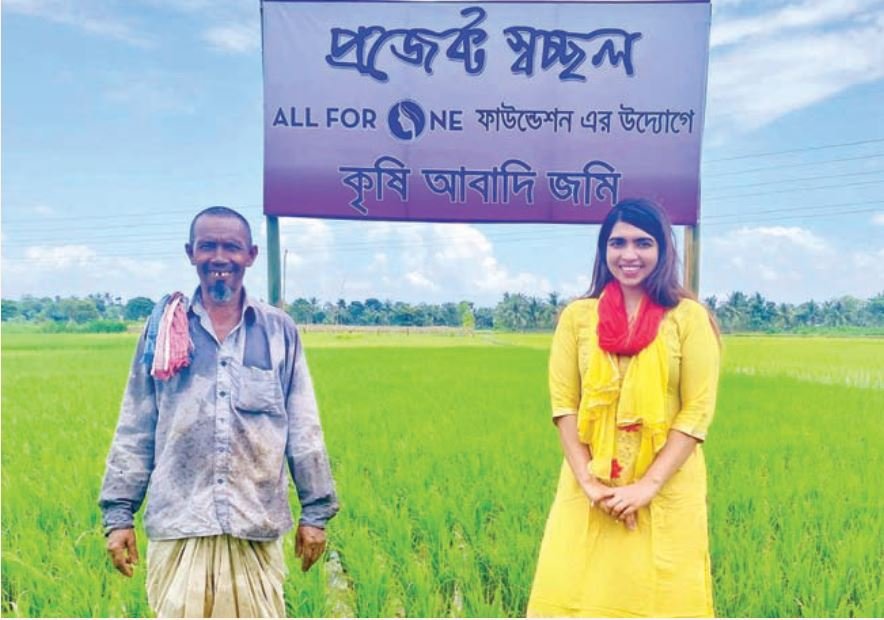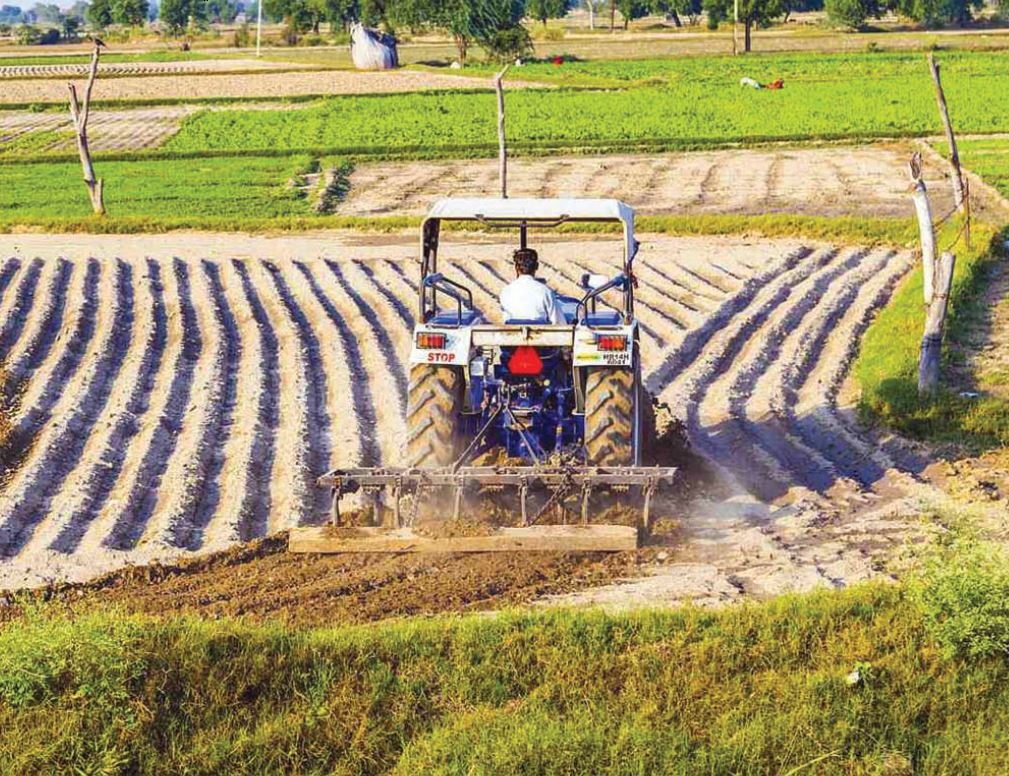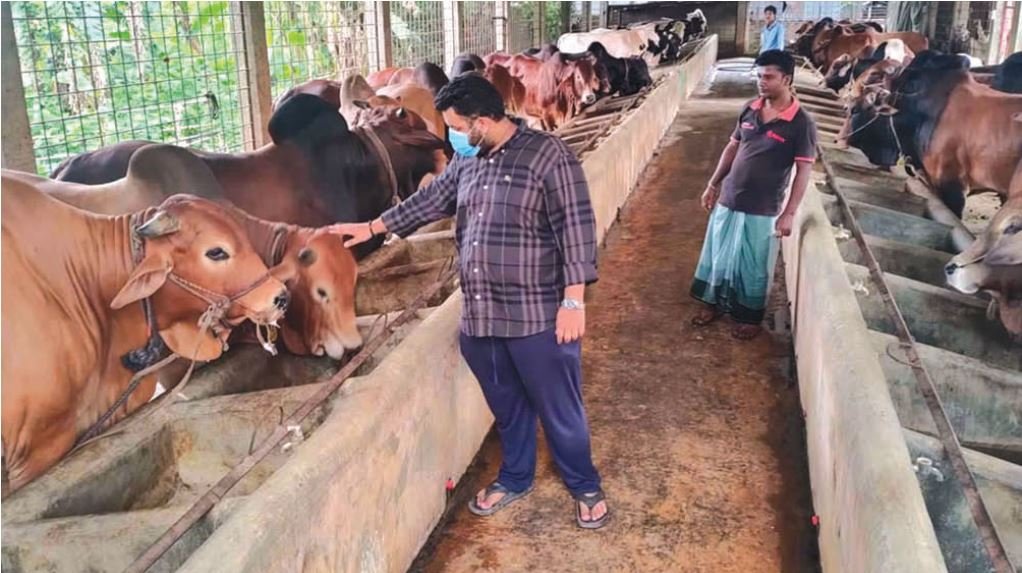Agriculture plays a fundamental role in the economy of Bangladesh and is considered one of its most productive sectors. While concerns remain regarding the potential impact of climate change on agricultural production and labor shortages resulting from rapid urbanization, there is a glimmer of hope. Educated youth in the country have displayed a growing interest in agriculture and livestock business in recent years, with some opting to pursue careers in agribusiness instead of conventional jobs, while others invest in the sector as an alternative source of income. Through their efforts, they are creating employment opportunities for others and improving food security by utilizing modern technologies to produce high-yielding, high-value crops and livestock.
THE IMPORTANCE OF AGRIBUSINESS AND AGRI-ENTREPRENEURS
Agribusiness is a term used to refer to economic activities derived from or connected to farm products. It encompasses all the steps required to send an agricultural good to market, including production, processing, and distribution. This industry is an essential component of the economy in countries with arable land since agricultural products can be exported.
You can also read: DIVERSIFYING AGRICULTURE, AVERTING FOOD CRISIS
Agriculture is the economic sector that employs the most people in the world and is the main source of food and income for many people living in poverty. Agro-industry can play a pivotal role in pro-poor growth strategies, particularly in developing countries such as Bangladesh where a significant percentage of the poor reside in rural areas. The development of agro-industry and agri-entrepreneurs has a significant impact on the local agricultural sector as well as the livelihoods of smallholder farmers. Investing in agriculture is not only one of the most effective strategies to improve food security and promote sustainability, but it is also essential to the country’s economic development. The agriculture sector has an impact on practically all the Sustainable Development Goals (SDGs) and is fundamental to the economy of developing countries.
According to the Food and Agriculture Organization of the United Nations (FAO), over 70 percent of the world’s food needs are met by small farmers. In Bangladesh, agriculture is one of the most crucial sectors of the economy, contributing 16% to the national GDP and creating job opportunities for around half of the total labour force. Although the agricultural sector’s contribution to GDP has decreased due to rapid growth in other sectors, it remains the lifeblood of Bangladesh’s economy. The sector requires more support to attract potential educated agri-entrepreneurs who can create more opportunities for the country.
SUCCESS STORIES OF YOUNG BANGLADESHI AGRI-ENTREPRENEURS
Kamrunnesa Mira is a notable young entrepreneur in Bangladesh who has made a significant impact on agriculture in a short time. She is well-known to rural women and farmers for her ‘Chashibon’ initiative, which aims to establish agricultural businesses, eliminate brokers, and promote fair trade between farmers and buyers.
After completing her studies, Mira decided to explore various social problems and their solutions instead of pursuing a conventional job. She introduced a new concept of social business for agriculture dependent Bangladesh, which inspires women to become selfreliant and create a fair price environment for farmers. Working closely with farmers, Mira recognized the need for an ecosystem that could address climate adaptation challenges in a scientific manner through farmers’ unions. To achieve this goal, she purchased land and started her farming business in Natore District. Mira founded an agricultural training centre that offers free online and offline scientific training to farmers by agricultural officers, trainers, and scientists.
Additionally, she developed a preorder-based agricultural system that considers savings, finance, and insurance to ensure farmers are free from local interest brokers and middlemen and are paid adequately for their products.
Mira has also linked micro-investors to farmers by sharing equity, allowing anyone worldwide to invest in farming in Natore and Chittagong.
Moreover, the farmers’ union has a non-formal literacy centre where they can receive basic education. In this way, Mira continues to make a valuable contribution to Bangladesh’s economy.

Livestock farming has also become an increasingly popular business venture for young entrepreneurs in Bangladesh. Faisal Bin Malek, who studied at Willes Little Flower School in Dhaka and later earned a CA degree in the UK, and his friend Shabbir Ahmed, who graduated from Eastern Texas University, joined forces with two others to start a cattle farm in 2017. They began with just two cows, but within three years, their farm had grown to 100 cows spread over 50 bighas of land. Their success has inspired many others to follow suit, and every year around 70,000 new cattle farms are being established in the country.
According to the Department of Livestock, a significant proportion of entrepreneurs entering the cattle farming industry in Bangladesh are young people, with around 70% falling in this category.
According to the Department of Livestock, a significant proportion of entrepreneurs entering the cattle farming industry in Bangladesh are young people, with around 70% falling in this category. As of 2019, there were 577,416 cattle farm owners in the country, of which only 57,000 were registered with the government. In the vicinity of Dhaka, there are approximately 5000 modern cattle farms owned by young entrepreneurs, which are equipped with state-of-the-art technology, including CCTV cameras, among other things. These farms also have online cattle sales, which have proven to be highly successful. It is estimated that approximately one million young people are now involved in the cattle farming industry in Bangladesh. This represents a significant success story for these young “fampreneurs” who are making a substantial contribution to the economy of Bangladesh.

USE OF NEW TECHNOLOGY IN AGRIBUSINESS
Technology aids in soil and field analysis, planting, and crop monitoring, which is critical to improving crop yields and advancing agribusiness. The use of new technology is vital to remaining competitive in the agribusiness sector. Farmers need to reduce crop costs and increase yield per square acre to remain competitive.
Fortunately, in our country, young agri-entrepreneurs are showing significant interest in agriculture and working to make all operations more technologically advanced and modern. The younger generation, who are technologically savvy, is modernizing the sector at a slow pace, but Bangladesh is gradually experiencing an increase in technology-based agricultural solutions. These innovative farming methods have numerous benefits for all stakeholders involved. The importance of technology-based agriculture in Bangladesh cannot be overstated when it comes to agricultural success.
Farmers in Bangladesh have been using rudimentary methods for centuries. The ability to remotely monitor weather, market prices, and demand, as well as receive helpful technical agricultural advice, is a significant benefit of intelligent technology and the digital era in general. However, technology has yet to provide the universal solution that many people in this region hoped for.
Most farmers, particularly those of an older generation, have limited access to these technologies, from the device itself to adequate and consistent electricity to operate or recharge them, or internet connectivity required to run applications or communicate with others. So, any technological tool provided to improve their livelihoods must be simple and user-friendly and the young minds are giving their efforts to make the agribusiness more tech-friendly ushering in a new era of industrial upheaval.

CHALLENGES FACED BY POTENTIAL ENTREPRENEURS IN AGRIBUSINESS
Young people represent the future for strengthening local food systems and food security, but they face many challenges. One of the primary obstacles is a lack of access to knowledge, information, and education, which can hinder the development of entrepreneurial ventures and farm productivity. Another challenge is limited access to land, which is crucial for starting a farm. In addition, rural youth often struggle with inadequate access to financial services, including credit, savings, and insurance, due to a lack of existing policies and procedures that support them.
Moreover, limited access to markets poses a challenge for young people, as they may not be able to engage in viable and sustainable agricultural ventures without such access.
“We grow crops with capital and labour. But due to a lack of a proper market system, we are not getting the proper prices. The government should work to bridge the gap between the farmers and the buyers to sustain the enthusiasm that has been created among the youth in agriculture.”
–Rakibul Haque
Bipanan Kendra Prakritik Krishi Naongaon
These problems are compounded by the growing influence of supermarkets and the rigorous standards of their supply chains, which can make it even more challenging for youth to access markets.
As a rapidly developing South Asian country, Bangladesh must focus on promoting agri-entrepreneurship to foster economic growth and generate employment opportunities for millions of people. The government must prioritize support for young, enthusiastic, and educated entrepreneurs to encourage their involvement in the agriculture sector. To motivate individuals to pursue farm business, it is important to address challenges and provide necessary facilities while establishing a policy framework that fosters healthy competition.
Moreover, to create a supportive entrepreneurial environment, it is essential to ensure adequate technological support for entrepreneurs. Without this support, productivity may fall short of expectations, hindering economic development.
To motivate and fuel the entrepreneurial spirit, the government could consider offering incentives, tax rebates, extended grace periods, and tax-free import/export facilities. Additionally, motivational training programs could help entrepreneurs recognize their significant contribution to society and the economy as a whole. It is important to recognize that the self-reliance and job creation efforts of agri-entrepreneurs in Bangladesh are making a substantial impact on the country’s economy, and we should continue to support and encourage their endeavors.
In an exclusive interview with PRESS XPRESS, K M Mazharul Islam Maruf, CEO MIM Fisheries and Agro, expressed his views on the role, potential, and obstacles faced by young agricultural entrepreneurs in Bangladesh.
In recent times, young entrepreneurs are turning towards agriculture and livestock. What motivates them to pursue agriculture and livestock as their industry of choice?
I think over the years; we were unable to create expected number of graduate jobs which is actually a global phenomenon rather than only in Bangladesh. Also in our job market, starting salaries are not the lucrative. Hence our enthusiastic younger generation started thinking of becoming entrepreneurs. By being an agro based country, lot of people found hope to do something in this sector. Comparatively in these sectors, someone doesn’t need huge funds to start at the beginning. That two factors inspired good number of young people to become agri-entrepreneurs. And, I won’t be surprised if over the years more and more younger generation would get on to this industry.
What kind of knowledge and training do young people need to become successful entrepreneurs in this business?
There are various trainings organised by the government that people can attend and develop their expertise. Recently there are large number of social media groups where young and educated farmers share their knowledge’s. Good number of videos available in YouTube where they can do research. This sector is changing very rapidly so relying just on training won’t be adequate. When they start after learning the basics, they can keep learning by handling day to day affairs and improve their productivity.
What are the main challenges of the farm business in Bangladesh?
The most important factor for me is climate change, which is affecting us heavily. Apart from that highbred GM crops bringing lots of new types of insect and fungal attacks on our crops which is creating a lot of trouble. In addition, there is huge margin between the selling prices of the farmers for their crops compare to the price that consumers pay. So, supply chain is big burning issue too. Moreover, storage facilities are inadequate for seasonal crops. However, there are numerous challenges which I see as opportunities where we can work and progress eventually over the years.

CEO of MIM Fisheries and Agro


